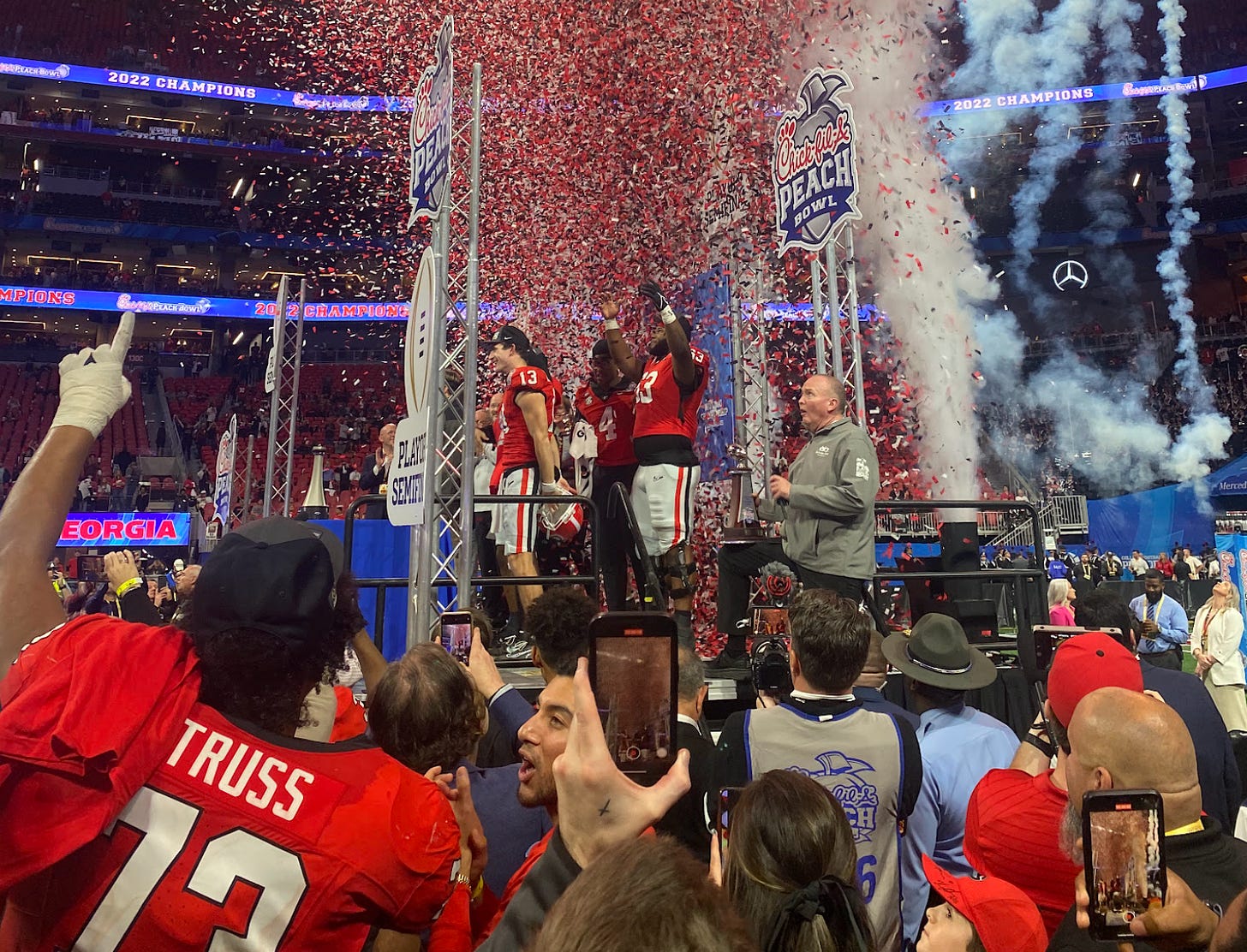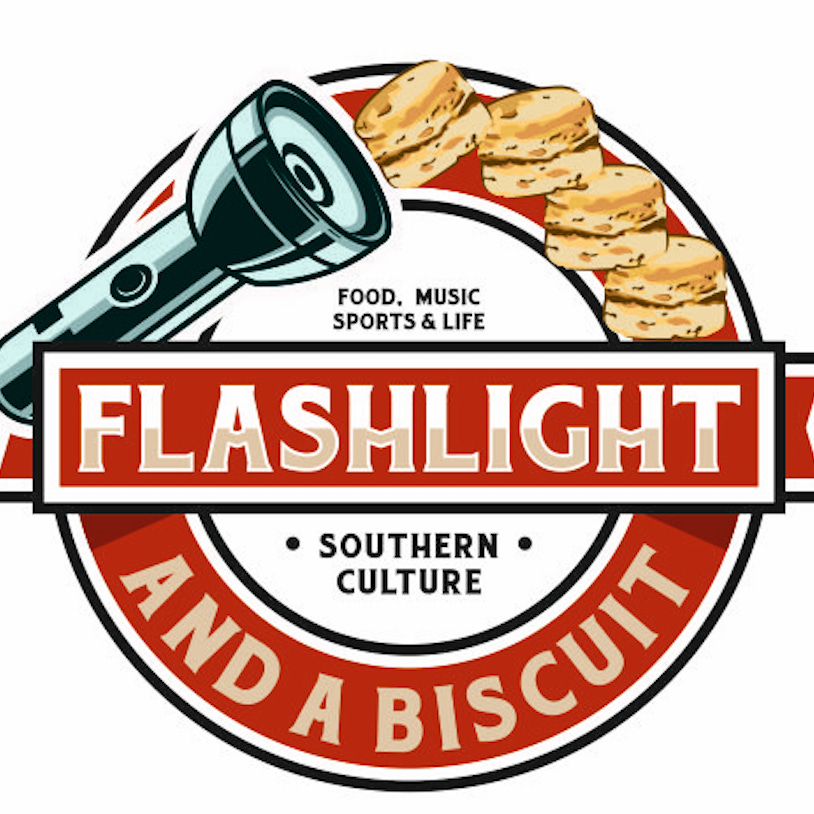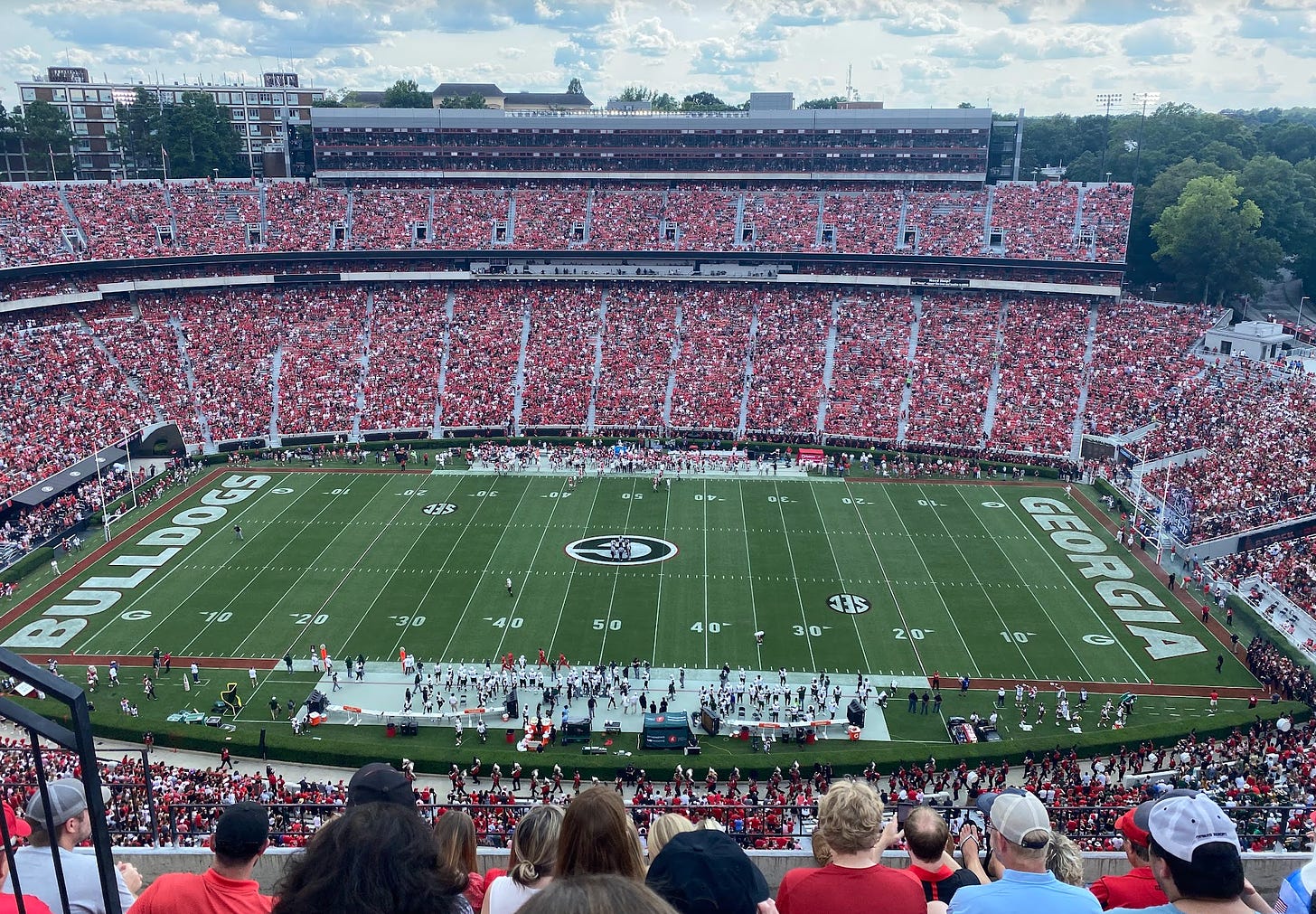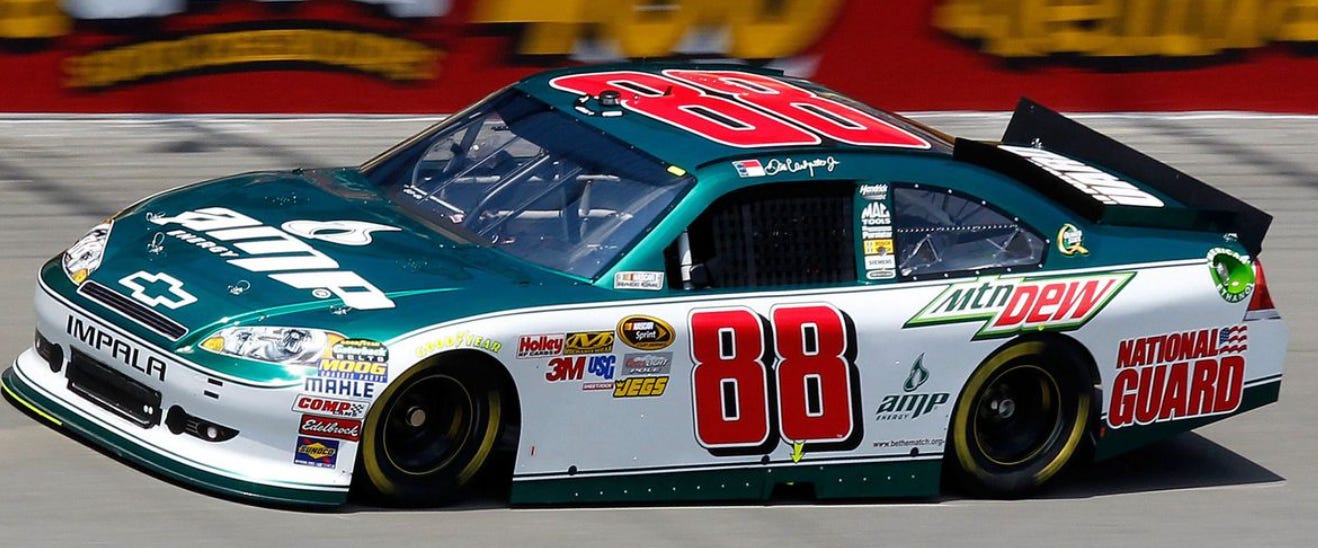Welcome to Flashlight & A Biscuit, my Southern culture/sports/music/food offshoot of my work at Yahoo Sports. Thanks for reading, and if you’re new around here, why not subscribe? It’s free and all.
It’s a strange feeling, getting everything you want.
Today, I’m going to dig into the cultural implications of the world-beating behemoth that is the Georgia Bulldogs, but to do that, I’ve got to start about 75 miles west of Athens and 50 or so years back.
When I was a kid, the Atlanta Braves weren’t just the worst team in baseball, they were one of the worst teams in all of professional sports, a clown show crossed with a goat rodeo. They made virtually every mistake a franchise could make — styling themselves as what would one day be called “disruptors,” assuming money could buy wins, thinking that they knew a better way to victory than longtime industry veterans, overpaying for washed-up talent, trading away young stars-to-be, hiring flat-out incompetent people for key jobs, even picking a terrible location for their stadium. You know, the whole Silicon Valley bubble mindset.
Still, fans in the South supported the Braves due to two key factors: 1. there were virtually no other pro sports options anywhere in the region, and 2. the one shrewd move the organization made: broadcasting its games over owner Ted Turner’s nascent cable network. Eighty percent of life is just showing up, and the Braves captured fans all over the South just by showing up on their TVs. Certainly not by winning.
Attendance throughout the ‘70s and ‘80s was terrible at Braves games, in part due to the crime — or fears of crime — in the parking lots and side streets of downtown Atlanta. As Clayton Tutor relates in the outstanding Atlanta sports history “Loserville,” Turner once jokingly responded to questions about crime by offering to run shuttle buses between the stadium and Atlanta’s affluent northern suburbs, so criminals could loot the empty houses in peace while suburban fans watched the game in safety. (You can imagine the firestorm that would happen if an owner tried that line today.)
Even though Atlanta, at one point, was one of only a handful of cities with all four major pro sports teams, success came rarely, if at all. Atlanta’s four pro teams of the era — Braves, Falcons, Hawks, Flames — lost so often and in such ridiculous ways that in 1975 the Atlanta Constitution, the morning newspaper, crafted a series of commentaries entitled “Loserville, U.S.A.” Shepherded and edited by the late Georgia populist poet laureate Lewis Grizzard, the series carved in stone the city’s rep as a bumbling, woeful pro sports town. And when Atlanta fans didn’t show up for playoff games, or booed their hometown star in the deciding game of the World Series, well, the “Loserville” rep became gospel. (Faceplants like blowing a Super Bowl the Falcons led 28-3 haven’t exactly helped rehabilitate the city’s image.)
What Grizzard and the rest of the gleeful critics who piled on Atlanta fans missed was the coming national preeminence of college sports. Granted, you would have to possess a pretty optimistic mindset in the 1970s to think that college football would one day become a multibillion-dollar business, with tickets to games going for five figures and expected athletic department donations for high rollers starting at six figures or more. Still, judging the fandom of Southerners by only focusing on pro sports is as narrow and limiting as judging the restaurants of New York City by only focusing on, say, the barbecue joints.1
Which brings us — at last — to the topic of this week’s newsletter. The University of Georgia won its second straight national championship earlier this week by skull-dragging a football team from the great state of Texas up and down the field, again and again. Georgia won the game 65-7, and it wasn’t even that close.
Georgia is now a two-time champion, and there’s legitimate — and defensible — talk about a dynasty developing in Athens. Combine that with the Braves’ World Series win in 2021 and the Atlanta United’s MLS championship a couple years before that, and all of a sudden you’ve got — well, maybe not “Winnerville,” but something very close to it.
(Aside #1: Georgia’s an hour’s drive from Atlanta, yes, but the city has largely adopted the Dawgs, since alumni tend to flow back to Atlanta in loud red-and-black waves. This might not go over well with fans of Georgia Tech or Georgia State, both of which literally play in the city of Atlanta itself, but it’s the truth.)
I wrote about this before the start of this past college football season: the bond that connects fans to colleges is deeper and richer than the fandom of a professional team; you don’t spend four formative years in the warm embrace of the Tennessee Titans, and you can’t go wander the lovely campus of the Miami Marlins. Yes, there are NFL fans who love their team enough to be buried in its colors — these mostly seem to be Steelers and Bills zealots — but I’d argue that the character of their fandom is a lot closer to college football than the usual pro sports fan, who loves the local NFL team the way they ally themselves with a brand like Coca-Cola or Ford.
(Aside #2: This is why so many Georgia fans found the recent failed Senate run of Bulldog legend Herschel Walker so dispiriting. The choice of Walker as a candidate was so cheaply cynical because it weaponized Georgia fans’ love for their Dawgs, turned it from something pure into something crass and petty. For the last 40 years, the greatness of Herschel was pretty much the one thing that everyone in the state could agree on, regardless of political party. Now? He’s One of Them to those who voted against him, he fell short of the goal line for those who voted for him, and he’s tarnished and smaller in the eyes of everyone.)
I’m only a Georgia fan by proximity; I don’t have any blood attachment to the school, though I do have dozens upon dozens of friends who do. If they’re happy, I’m happy, and these days, they’ve all got happiness to spare. After 40-plus years of post-Herschel misery, watching neighbors and rivals like Clemson, Alabama, Florida State, Auburn (!), Tennessee (!!) and Florida ($&@!) win national championships, falling short year after agonizing year, Georgia fans had to feel that the Atlanta sports curse had leaked into the groundwater and was infecting Clarke County, too.
Times have most certainly changed.
The South has spent most of the last two centuries defining itself in opposition to the rest of America, sometimes vocally, sometimes violently, sometimes using sports as a proxy for warfare. The 1926 Rose Bowl pitted Washington against a little backwater school from the South by the name of Alabama, and boosters of the team then recently dubbed “Crimson Tide” billed the game — which Alabama won — as a chance to even the score in the War Between the States. Southern music, Southern literature, Southern food … it all flowed from the trauma of the Civil War, if you know where to look.
The scars and legacies of the Civil War still remain visible in the South, but the whole “this football ass-whipping is revenge for Sherman burning Atlanta!” mindset is pretty much gone. A half-century’s worth of southward migration from colder climes will change a region. It’s tough to keep petty jealousies and generational rage burning when everyone around you has either moved on or never felt the same way to start.
Plus, if we’re talking college football, let’s be honest — nobody in the South gets to play victim anymore. Southern football dominates all other regions of the country combined and multiplied. I won’t dig into the statistical nuances of Southern football supremacy — that’s for the day job — but the overall gist is this: on the football field, the South is now the bully giving everyone wedgies, the bouncer throwing wannabe tough guys out into the parking lot, the Marvel superhero punching The Horned Frog2 into orbit.
Which, in a long and winding way, brings us back around to our opening sentence. What happens when something you’ve wanted for so long actually shows up, and it’s even better than you could have imagined? How do you deal with prosperity on a national, life-affirming level? (With a whole lot of celebratory bourbon and some galactic-level hangovers, if you’re my friends.)
Will Georgia fans bask in the pride of longstanding fandom finally paying off once again? Will they get greedy? Complacent? Entitled? There’s that old proverb about how the best way to make someone miserable is to give them their heart’s desire. Will that fate befall Georgia fans, or will decades of accrued loss keep Bulldog fans the tiniest bit humble? No matter how the next few years play out, it’s a nice problem for Dawg Nation to have.
Enjoy the week, friends, and we’ll see you right back here next Saturday.
—Jay
This is issue #88 of Flashlight & A Biscuit. Check out all the past issues right here. Feel free to email me with your thoughts, tips and advice. If you’re new around here, jump right to our most-read stories, or check out some of our recent hits:
Hellfire & White Lightning, Part 2: The daredevil choir boy
The best (and worst) Flashlight & A Biscuit stories of 2022
The joy of the perfect college bar
Could you survive a Waffle House brawl?
What does “Flashlight & A Biscuit” mean, anyway?
If you dig this newsletter, share it with your friends. Invite others to the party, everyone’s welcome.
They stink, for the record.
There has been a Frog-Man and a Cyberfrog in comic books, but never a Horned Frog. Get on that, Marvel.







